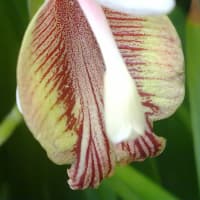Alpinia oxyphylla is a herbaceous plant that produces the “Yi Zhi Ren” fruit, also known as Black Cardamom or the ‘seed of wisdom.’
Healing Properties
Antioxidant
Anti-T2DM
(Prevents Type 2 diabetes mellitus)[1]
Gut Health
Modulates gut microbiota
Brain Health
A. oxyphylla is effective for cognitive function improvement.[2]
Neuroregeneration (Nerve Regeneration)
A. oxyphylla is effective for the regrowth and repair of nerve tissues.[2:1]
Disease / Symptom Treatment
Alzheimer’s Disease
Alpinia oxyphylla paired with Schisandra chinensis demonstrated the ability to ameliorate abnormal changes in cognitive behavior induced by Amyloid beta plaque formation. Alpinia oxyphlla & Schisandra chinensis also inhibits the inflammatory signaling pathway in the brain to help cut down the damage of apoptosis. This herb pair might be a potential therapy for cognitive and behavioral deficits caused by Alzheimer’s.[2:2]
Dementia
Diabetes
- Decreases urine albumin excretion.
- Decreases resting blood sugar levels.
- Improves glucose intolerance.
- Decreases Glycated hemoglobin levels.
- Promotes more efficient glycemic control.
Renal injury
Diabetic Induced Renal Injury can severely disrupt the architecture of the kidney, causing lesions and tubular atrophy.
- 500 mg/kg of Alpinia Oxyphylla attenuated renal damage and nearly fully recovered kidney structure.[1:1]
Diarrhea
Inflammatory conditions
Title: Alpinia oxyphylla Miq. Extract Prevents Diabetes in Mice by Modulating Gut Microbiota
Author(s): Yiqiang Xie, Man Xiao, Yali Ni, Shangfei Jiang, Guizhu Feng, Shenggang Sang, and Guankui Du
Institution(s): First Affiliated Hospital of Hainan Medical University, Haikou 571199, China; Department of Biochemistry and Molecular Biology, Hainan Medical University, Haikou 571101, China
Publication: Journal of Diabetes Research
Date: 4 June 2018
Abstract: Recently, the role of gut microbiota in the development of obesity and type 2 diabetes mellitus (T2DM) has been highlighted. We performed an 8-week administration protocol on T2DM (C57BL/6J db-/db-) mice and fecal samples were collected. Comparisons of fecal bacterial communities were performed between db-/db- mice and normal mice (DB/DB) and between the db-/db mice treated and untreated with AOE using next-generation sequencing technology. Our results showed that the db-/db-AOE group had improved glycemic control and renal function compared with the db-/db-H2O group. Compared with the db-/db-H2O group, AOE administration resulted in significantly increased ratio of Bacteroidetes-to-Firmicutes in db-/db- mice. In addition, the abundance of Akkermansia was significantly increased, while Helicobacter was significantly suppressed in the db-/db-AOE group compared with the db-/db-H2O group. Our data suggest that AOE treatment decreased blood glucose levels and significantly reduced damage of renal pathology in the T2DM mice by modulating gut microbiota composition.
Link: https://doi.org/10.1155/2018/4230590
Citations: ↩︎ ↩︎Study Type: Human Study: In Vivo
Title: Effect of Alpinia oxyphylla—Schisandra chinensis herb pair on inflammation and apoptosis in Alzheimer’s disease mice model
Author(s): Yu Qi, Xinhui Cheng, Huiting Jing, Tingxu Yan, Feng Xiao, Bo Wu, Kaishun Bi, Ying Jia
Institution(s): School of Traditional Chinese Materia Medica, Shenyang Pharmaceutical University, Wenhua Road 103, Shenyang, 110016, China; School of Functional Food and Wine, Shenyang Pharmaceutical University, Wenhua Road 103, Shenyang, 110016, China; School of Pharmacy, Shenyang Pharmaceutical University, Wenhua Road 103, Shengyang, 110016, China
Publication: Journal of Ethnopharmacology
Date: March 2019
Abstract: This study demonstrated that ASHP had the ability to ameliorate abnormal changes in cognitive behavior, biochemical and histopathology induced by Aβ1–42 in the mouse model. The powerful role of ASHP is to inhibit the NF-κB inflammatory signaling pathway and cut down the damage of apoptosis. This study revealed ASHP might be a potential therapy for cognitive and behavioral deficits.
Link: Source
Citations: ↩︎ ↩︎ ↩︎
